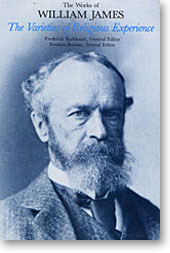| Excerpts from
The Varieties of Religious Experience A Study in Human Nature" by William James  Order in Adobe PDF eBook or printed form for $4.95 (+ printing charge) Click here to order from Amazon.com for $10.66 Book Description In The Varieties of Religious Experience: (1902), William James offers a sense of validity to the formerly abstract idea of spiritual experience. With an understanding of physiology, psychology, and philosophy, James studied cases of religious inspiration and concluded there were specific aspects of human consciousness that contained energies that could come to a person’s assistance in time of great need. The result is what he refers to as the religious experience. Trained in chemistry and medicine, James looked at religious experience as a scientist might, by researching many case studies. However, his theories about religious experience were also heavily influenced by his philosophical interests, which drew him to conclude that an unseen reality does exist and is available to everyone for exploration. His sentiments were somewhat aligned with the beliefs of the transcendentalists, with his work honoring the individual rather than the institutions of religion. The Varieties of Religious Experience is actually a collection of lectures James delivered in Edinburgh, Scotland. The lectures were sponsored by Adam Gifford, who was interested in promoting a series of studies of what he referred to as a natural theology. James’s lectures became by far the most popular in the series. James also received international attention and praise as one of the first American philosophers to have his ideas welcomed and respected in Europe. Although not cited as James’s best book, The Varieties of Religious Experience continues to be referred to as one of the best books on religion. In his day, intellectuals tended to categorize religious experiences as no more than a nervous condition or a reaction caused by indigestion. The Varieties of Religious Experience portrays the need for a sense of the spiritual as a natural and healthy psychological function. The
Varieties
of Religious Experience
has been so successful
that it has been reprinted thirty-six times. It is lauded as being as
influential and as significant in the twentieth century as it was when
first published. To emphasize this point, the board of the Modern
Library established that James’s book is the second-best nonfiction
book of the twentieth century. About the AuthorWilliam
James (1842–1910),
brother of
writer Henry James, was born in New York and studied medicine at
Harvard, where he taught from 1872; James continued on to write books
and become one of the most renowned psychologist-philosophers in the
Western world. His other famous works include Principles of
Psychology
(1890) and Pragmatism (1907).
Order in Adobe PDF eBook or printed form for $4.95 (+ printing charge) Click here to order from Amazon.com for $10.66 |